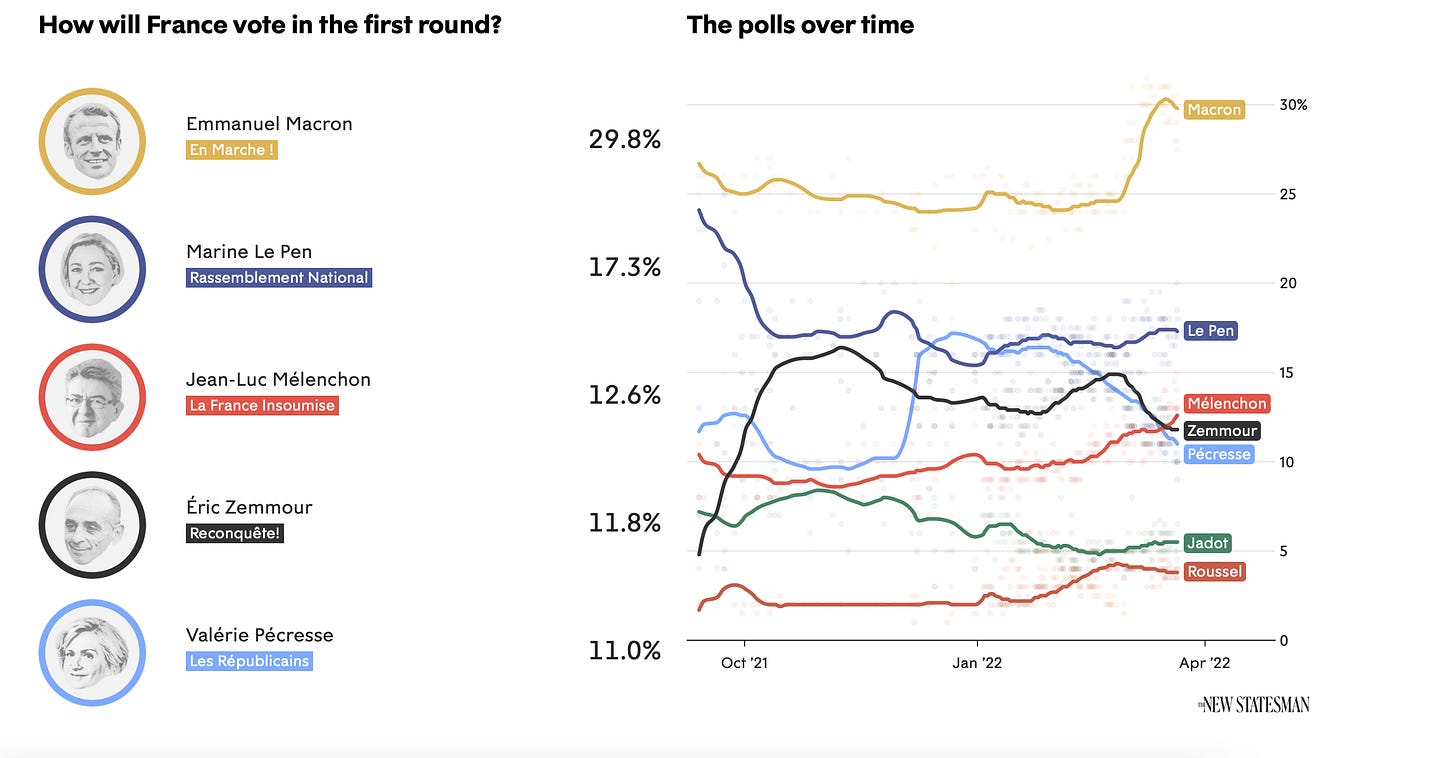Claire—Today at 5:00 pm Paris time: Join Arun Kapil, Jérome Clavel, Tim Smyth, Monique Camarra and moi for the French Election Twitter Summit.

Catch up beforehand, if you like, with Le Monde’s new English-language section:
How does a French presidential election work? The first round of the election takes place on April 10, the second round on April 24. Here is what you need to know about the candidates, the election, the campaign, the voters and the timeline.
An identity crisis for France’s socialist and conservative parties. “Expected to underperform in the upcoming presidential election, two parties representing France’s left and right will inevitably have to reexamine their role in French politics. ‘Le Monde’ columnist Gilles Paris shows another very real prospect : a fall into oblivion.”
Also:
Ukraine war puts France’s NATO-sceptic presidential candidates in a tight spot.
Turnout concerns loom large for French presidential election frontrunners.
How Russia’s war on Ukraine is shaping the French presidential race.
‘Happy days’: French Communist candidate promises a return to the good times. (If you listened to the last summit, you’ll remember Arun was struck by his feel-good vibe.)
A handy graphic:
Things we might talk about:
Macron will win. His biggest worry is such high level of voter abstention that he won’t really have a mandate for dramatic second-term reforms.
Valérie Pécresse tested positive for Covid19. She said she would campaign remotely. This puts the nail in the coffin of her campaign, one suspects?
Macron hasn’t been doing much campaigning. Instead, he’s been at NATO meetings with the US president, a G7 summit, and a meeting with the European Council. He also announced plans (as yet no details) for a humanitarian evacuation of Mariupol. In other words, he doesn’t need to campaign. He’s busy being president of France; his rivals look like fractious little ankle-biters. His campaign slogan is “avec vous,” which is uninspired.
The Russia connection is poison—as it ought to be—for Zemmour and Marine Le Pen. Le Pen allowed that she wouldn’t quit NATO right now, all things considered; that would be a bad signal. But she’s sticking to her guns: “There is no question, especially at this time, of leaving the Western camp—but it must be done.” Yet she could still make it to the second round, faut de mieux.
The disgrace of Zemmour and Le Pen, oddly, offers a slender hope to far-left candidate Jean-Luc Mélenchon, although he too has wallowed publicly in Russian mud. (In 2014, following the Maidan revolution he disparaged “an adventurous putschist power, in which the neo-Nazis have a very detestable influence.” This is, of course, the Moscow line, straight-up.) The Green Party candidate Yannick Jadot and the Socialist Party candidate Anne Hidalgo have both taken pains to remind him of that.
The communist guy, Roussel, has shown how a candidate who isn’t a communist could win an election in France: by not being such a dreary pill all the time.
What’s the future of French politics now that its major political parties have all-but-formally gone out of business?
Is there any chance we could see the last of the far right after their coming, extremely well-deserved wipeout?
Latest polls, more or less:
Eight candidates are asked, “Is Vladimir Putin a dictator?”







If I just take your handy graphic as a sign, it seems troubling. Half of the people want to withdraw from NATO, more than half don't want to support Ukraine by sending arms. Very clearly there's an isolationist sentiment. Perhaps I am wrong. But if I am correct, tell me why that exists, please.